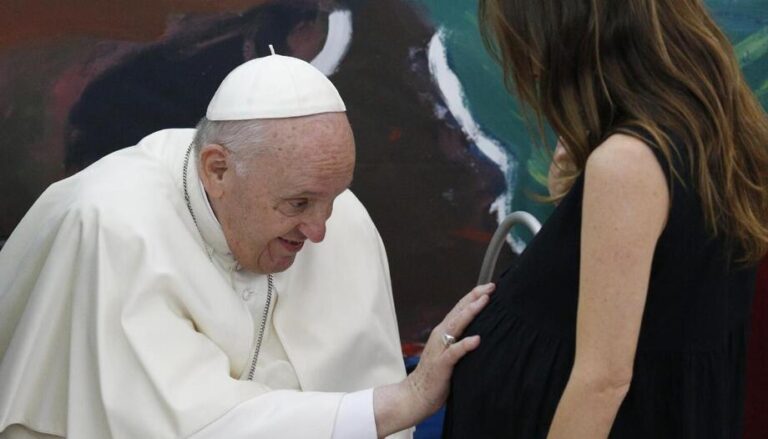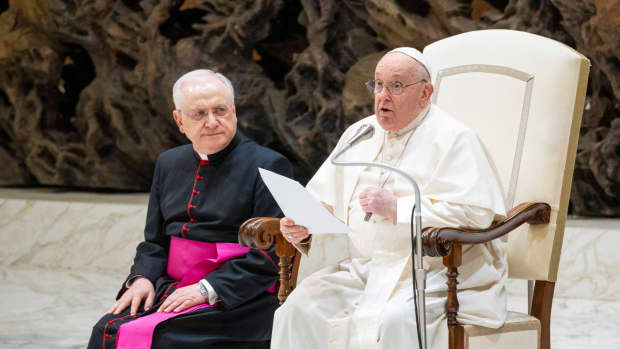Pope Francis Calls For Worldwide Ban On Surrogacy
Why has Pope Francis declared a global ban on surrogacy, igniting a firestorm of debate? The pontiff's strong condemnation of the practice, labeling it "deplorable," marks a significant shift and demands careful examination.
From the heart of the Vatican, in Rome, Pope Francis has recently galvanized the global stage, issuing a clarion call for the worldwide prohibition of surrogate motherhood. His pronouncements, delivered with characteristic force, have resonated across continents, stirring a complex mix of reactions and prompting intense ethical scrutiny. This isn't the first time the Pope has weighed in on this contentious issue. Earlier this year, in a speech that made immediate headlines, and again on January 8, 2024, the Pope doubled down on his stance, embedding the issue of surrogacy within a broader discussion about threats to global peace and the inherent dignity of humanity. His annual foreign policy address, a traditional platform for addressing the world's ambassadors to the Vatican, became the stage for this assertive declaration.
The Pope's perspective, articulated with unwavering conviction, is rooted in a deep concern for the vulnerable, particularly women and children. He views surrogacy as a grave violation, a practice that intrinsically undermines the dignity of both the woman who carries the child and the child itself. In his view, a child is a gift, a sacred entity, and should never be subjected to the terms of a commercial transaction. This perspective, central to his reasoning, forms the foundation for his unwavering call for a universal ban. He explicitly included the commercialization of pregnancy in the list of threats to global peace, thus elevating surrogacy to a level of international concern.
The context of the Pope's condemnation is crucial. It's not just about the practice itself, but also about the broader social and economic dynamics at play. The Pope explicitly pointed out how surrogacy can be a means for the rich to exploit the poor, creating a system where women, often in vulnerable situations, are subjected to what he perceives as a form of exploitation. His words resonate with those who see surrogacy as potentially commodifying the female body and undermining the fundamental rights of both the surrogate mother and the child.
In his speeches, the Pope also frequently addresses other pressing global crises and conflicts. He has frequently mentioned the ongoing situations in Israel and Palestine, Ukraine, and Nicaragua. The inclusion of surrogacy within this framework illustrates the Pope's understanding of its far-reaching impact on human dignity and international ethics.
In a significant interview with CBS, the Pope underscored the Church's welcoming stance towards all people while clarifying aspects of blessings authorized by Fiducia Supplicans. This context makes his stance on surrogacy even more significant, as it highlights a core principle of embracing diversity, while at the same time, condemning what he sees as an ethical breach. The Pope's consistent condemnation of ideologies and his reiteration of calls for negotiated solutions to global conflicts further illuminate the complexity of his perspective.
The timing of these pronouncements is also significant. In a world grappling with complex ethical and moral dilemmas, Pope Francis's stance serves as a reminder to consider these problems with clarity and moral courage. His strong condemnation aligns with previous statements, including an interview on '60 Minutes' on May 19, where he stated that "sometimes surrogacy has become a business, and that is very bad."
Pope Francis's actions have also been noted in the news on other issues, and his commentary has sparked debate and scrutiny. The Catholic Church, under his leadership, is addressing a series of challenges, like those related to family dynamics, alongside threats to human dignity, which include pornography and surrogacy. This wider context of addressing such problems amplifies the significance of his perspective.
The practice of surrogacy has gained increasing attention and has become the subject of international discourse. The arguments about human dignity and exploitation require consideration in the context of the complexities of modern society.
| Attribute | Details |
|---|---|
| Name | Pope Francis (Jorge Mario Bergoglio) |
| Born | December 17, 1936, in Buenos Aires, Argentina |
| Nationality | Argentine (born); Vatican City State (current) |
| Religious Order | Society of Jesus (Jesuits) |
| Profession | Catholic Priest, Archbishop, Pope |
| Papacy Began | March 13, 2013 |
| Education |
|
| Key Accomplishments/Positions |
|
| Notable Actions/Beliefs |
|
| Reference | Official Vatican Website |
The Pope's stance, which has been reiterated throughout his papacy, is not new. He previously expressed concern that surrogacy could involve human trafficking, which he condemns. His statements are often seen as a moral compass in global affairs.
Olivia Maurel, who was born via surrogacy in the United States in 1991, has now emerged as a leading advocate for the abolition of "womb renting," a practice that Pope Francis describes as "deplorable." Her perspective reflects a growing debate among those affected by these practices and contributes to the complexity of the discussion.
The Vatican's representatives at the United Nations have also played a role in advancing the Church's position. Their calls for a global ban reflect a commitment to pursuing this agenda at the highest international levels. The Church's voice in these settings emphasizes its position on human dignity.
The Pope's statements are part of a broader dialogue encompassing family dynamics, societal pressures, and the protection of human rights. This dialogue seeks to create awareness and to promote actions that are aligned with the Church's values. By placing surrogacy in this context, the pontiff brings attention to how different societal structures can impact the well-being of individuals.
The debate surrounding surrogacy is nuanced, including discussions about the well-being of women, the rights of children, and the ethical implications of assisted reproduction. The Pope's involvement underscores the need for thorough consideration of all elements involved. The discussions are complex, with legal, ethical, and emotional aspects requiring deliberation.


